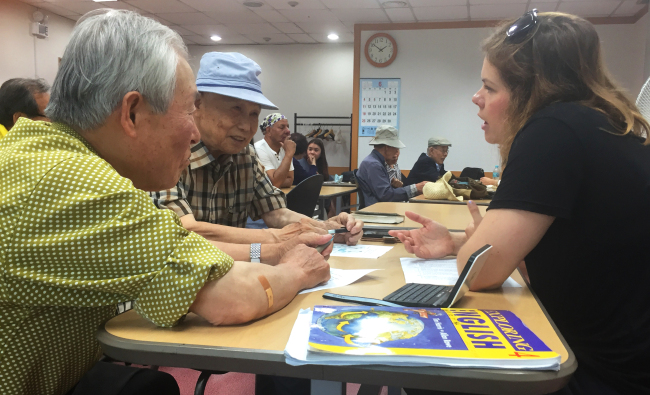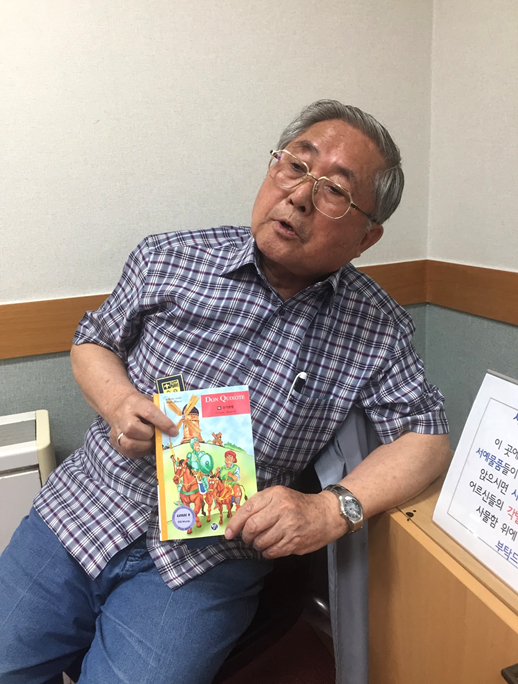On a hot June afternoon, a dozen expats met at Hannam Station Exit No. 1 and took a short walk over to Yongsan Senior Welfare Center to strike up conversations with the middle-aged men and women there.
They are a diverse bunch. Some are on working holidays, drawn to Korea by a fascination with K-pop. Others are between jobs, keen to verify the depiction of the Korean War in their textbooks with the generation who experienced that period in history.
Inside the teaching room, they stood in single file and wrote their names on a board. Kim Soon-shim, who has been teaching for 42 years, told the advanced English class in front of him to focus. It was time for volunteers to converse freely with students, he announced, and for the students to put the English he had been teaching them to practical use.
“It gives us a great challenge and our students enjoy talking with them,” says Kim, a former university professor, who began to learn English at the end of World War II. “It gives my students a rare chance to speak out about what they have learnt, so it is a very precious time.”
Looking around the room, watching groups talk about topics as varied as their ambitions, solutions to boredom, competitive streaks and education over an hour, it was hard to disagree.
They are a diverse bunch. Some are on working holidays, drawn to Korea by a fascination with K-pop. Others are between jobs, keen to verify the depiction of the Korean War in their textbooks with the generation who experienced that period in history.
Inside the teaching room, they stood in single file and wrote their names on a board. Kim Soon-shim, who has been teaching for 42 years, told the advanced English class in front of him to focus. It was time for volunteers to converse freely with students, he announced, and for the students to put the English he had been teaching them to practical use.
“It gives us a great challenge and our students enjoy talking with them,” says Kim, a former university professor, who began to learn English at the end of World War II. “It gives my students a rare chance to speak out about what they have learnt, so it is a very precious time.”
Looking around the room, watching groups talk about topics as varied as their ambitions, solutions to boredom, competitive streaks and education over an hour, it was hard to disagree.

These seniors clearly have a lot to say. They are just searching for a nonjudgmental space to test the waters.
For Lee Jim-kee, the class allows him a rare chance to socialize and keep his mind alert. The 86-year-old has been battling cancer for nearly a decade, but refuses to let fatigue from his treatment keep him housebound.
“I have no other place to go right now,” he says. “If I stayed at home, my health would be getting worse. If I move around, I can feel healthy.”
During his working days, he had to negotiate business contracts in fluent English, traveling as far as England, America and Europe. Doing activities at the center, including translating a Time Magazine page once per week with his peers, helps him reminisce about fonder memories abroad.
Another senior student, Kim Hag-soo, says the program has improved his language abilities and willingness to share his wisdom with a younger generation.
When he enrolled in the classes 11 years ago he struggled to hold a conversation in English, but this is no longer the case.
“I think it is a very good opportunity for seniors to talk with foreigners and feel the belief that they can speak English,” the 75-year-old says.
“I also come here to learn more, study language and take part in the physical activities to improve my health.”
The program is indeed organized with the mental wellbeing of the senior population as a focus. Katherine Cortiza, who coordinates the volunteers on behalf of the Itaewon Global Village Center, says the idea behind teaching the seniors English is to keep their minds sharp.
“It helps delay, not necessarily stop, Alzheimer’s disease,” she says. “It is also a good way for them to socialize and prevent depression.”
Not all topics are fair game though.
“Koreans can be a bit frank,” Cortiza explains, which can come across as confrontational to some first-time volunteers. For these reasons, she suggests steering away from discussing politics, religion or race, unless attendees are prepared for some opinionated responses.
And yet it’s this unique perspective from a different generation that appears to attract the majority of the younger volunteers.
Irina Holt, a 31-year-old expat, has only been married for two years. She enjoys asking the seniors for advice on how they have kept the passion alive in their relationships for over 50 years.

“I want to know their secrets,” she laughs. “They share and are so happy to as well. I want to be like them in my 70s and 80s.”
At the other end of the spectrum is the youngest volunteer, 16-year-old Romy Kim. She is on summer break and is thankful for the opportunity to facilitate conversations across generations.
“I personally want to hear their perspective on the world and their lifestyle,” she says. “I really want to see their thoughts on the world.” Her favorite questions to ask include advice on fulfilling her ambitions and getting tougher as she begins to take on the world.
Nestled away in the corner though is Kim Soon-shim, or “Sonney” as he is fondly known. He seems to derive the most satisfaction from watching his students engage with their new friends.
“English is widely spoken in the world and wherever and whenever they go they think English is used so no other language is necessary,” he says. “They are very eager to learn English.”
He chuckles while watching his students excitedly ask foreigners about their first impressions of Korea; a simple pleasure after a lifetime of teaching
By Aparna Balakumar(a.balakumar@heraldcorp.com)
-
Articles by Korea Herald




![[Weekender] Pet food makers bet big on ‘recession-free’ pet food market](http://res.heraldm.com/phpwas/restmb_idxmake.php?idx=644&simg=/content/image/2024/05/10/20240510050754_0.jpg&u=20240512145510)

![[Drama Tour] Romantic trip to ‘Queen of Tears’ filming spots](http://res.heraldm.com/phpwas/restmb_idxmake.php?idx=644&simg=/content/image/2024/05/09/20240509050798_0.jpg&u=20240511190213)


![[LLG] Unseen inheritance: Trauma of transnational adoption 'trickles down' to adoptees' children](http://res.heraldm.com/phpwas/restmb_idxmake.php?idx=644&simg=/content/image/2024/05/12/20240512050141_0.jpg&u=20240512163544)









